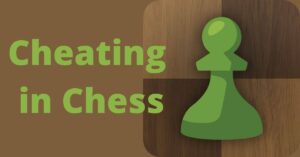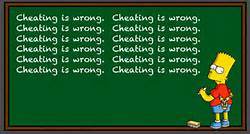Is Hans cheating? That question continues to roil the chess world, and beyond. Ever since Magnus Carlsen formally made an accusation that’s been speculated in the chess circles for over a year, it’s been a major news story. Is Hans Cheating? It’s not the question I will answer today. Sorry.
I’d like to discuss the notion of a predetermined result. The Is Hans Cheating question brings the problem into great clarity, for me at least. It’s a question that affects not only the chess community but our general perception of the world at large.
Do you have a strong opinion about Hans cheating? Will his future results change your opinion about that? No, they will not. Let’s discuss.
Hans can’t Win and he can’t Lose
If you, like me, tune into chess tournaments; there is vociferous debate in the chat rooms on the subject. Is Hans cheating? There are those who say he absolutely did not cheat against Carlsen and those that say Hans most certainly did cheat in that match and others as well. The debate rages during the current United States Chess Championship in which Hans is competing.
One of the interesting parts of the debate is Hans defenders frequently point out Hans can’t win. If he wins a game then his detractors assume he is continuing to cheat. If he loses then that means his past cheating is exposed because, with the new rules in place, he can’t cheat now.
The problem is these self-same defenders are guilty of the exactly the same thinking, only in reverse. If Hans loses a game, it’s because of the pressure he’s under and it doesn’t prove anything. If he wins a game then it shows he’s didn’t cheat in the past because he can still win under more stringent scrutiny.
In other words, whether you think Hans is cheating or not, you look at events through the proverbial rose-colored glasses and come to the conclusion that best suits your narrative. You will not, under almost any circumstance, change your mind.
It’s not just Chess
This is not just an issue with the Is Hans Cheating question. I see this every day in online debates. Both sides are completely unwilling to interpret any fact, any event, any argument in a way that persuades them to change their point of view. Everything feeds their predetermined decision. Nothing contradicts it. It matters not how many knots she or he must tie themselves into to achieve the desired result.
I suspect this is a human condition. Julius Caesar wrote: Men in general are quick to believe that which they wish to be true. I’d add only one caveat to Caesar’s insightful comment. Women too.
Conclusion
The only weapon against this enemy is critical thinking. As I watch the United States and the world drift toward totalitarianism, as I see people eagerly embrace leaders who demand absolute rule, as I watch in dismay as people gleefully talk about disenfranchising, hurting, even killing those who disagree with their views, I am ever more convinced we must start a critical thinking curriculum at the earliest moments of our educational system.
Will it happen? You tell me.
Tom Liberman


